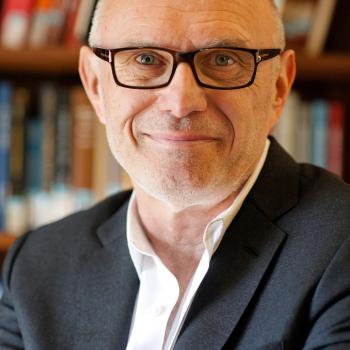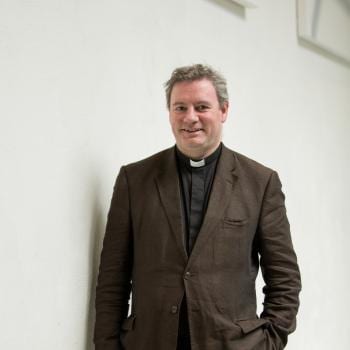Fleming Rutledge
Why do you love teaching, preaching, researching, and writing about theology?
First of all I love theology because it is my calling from God. Everyone who knew me as a pre-teen observed that I was intensely interested in theological doctrine. A calling—any calling—is something God gives, at his pleasure. I’m sure that, for example, Dr. Francis Collins would tell the same story about science (not that I’m in his class). If you love a worthy subject and give your life to it, you will find remarkable evidence along the way that God led you there and continues to guide you in your commitment.
But more important still, theology is truly “the queen of sciences” for one obvious reason. Its subject is God—the God who is not an object of our study but the Lord of our study, and indeed, of all that exists, including science itself. And it is the queen of sciences because its source is the living, lifegiving, and inexhaustible Word of God.
What could be more wonderful than that?
What is one “big idea” in your scholarship? What kind of mark do you want to leave on scholarship and your readers in your writing career?
The “big idea” is the prior, prevenient agency of the living God in all things. That useful word “prevenient” (going before) is familiar to older Episcopalians who grew up with the 1929 Book of Common Prayer. God’s grace “prevenes” our responses. But more radical still, God not only goes before but is active in our responses. To quote the BCP again, “all our works [are] begun, continued, and ended in thee.” Many might be surprised to know what a controversial affirmation that is. We would prefer to think that God offers us various choices and then allows us freedom to select them. We therefore have a reductive understanding of the God who, in the Bible, is actively shaping human affairs and taking hold of our wills to do so. Augustine calls this “perfect freedom,” because only in the perfect will of God do we find release from the captivity to Sin that pervades all flesh and contaminates human will.
A corollary to this is the apocalyptic cosmology of the New Testament, which insists that there is an independent Adversary of God (personified as Satan, or “the ruler of this world,” as Jesus calls him in the Gospel of John). As a consequence of the Fall, this Adversary has a fatally irresistible grip on human nature. Human will cannot overcome this Power. Only God is potent against this Enemy, and in the cross and resurrection of his Son has achieved victory. We have a living Lord over Sin and Death, who acts in this present world according to the promised consummation that will arrive with him in the final Day of the Lord.
Who is one of your academic heroes and why do you admire that person?
Karl Barth is the obvious and foremost one, but to mix it up a little I’d like to say Perry Miller, the great Harvard historian who specialized in the Puritan era in New England. He was a titan, and many of his students have been stars. (Sad to say, he was also an alcoholic—like Graham Greene’s “whiskey priest” in The Power and the Glory.) When I was a student at Union Theological Seminary in New York, a professor noticed that I was always sticking up for the Puritans and recommended that I read Miller’s essay, “The Marrow of Puritan Divinity.” I fell head over heels. I love Miller because he rescued the Puritans from the stereotypes and the scorn; because, though he was an atheist, he admired their intellectual faith; and because he was a superb literary stylist. His student Edmund S. Morgan almost equaled him; anything Morgan wrote about the Puritans is worth reading.
What books were formative for you when you were a student? Why were they so important and shaping?
I was in seminary when I read these three formative books.
- The Feminization of American Culture, by Ann Douglas (who was one of Perry Miller’s students at Harvard). It showed me that I could be “masculine” in theology without losing my identity as a woman, wife, and mother. There are plenty of women in systematic theology now, thanks be to God, but in 1971 there were virtually none that I knew of, so I needed this powerful pedestal to climb on. Ann Douglas was gracious enough to meet with me. We sat together more or less at the feet of Alma Mater on the Columbia University campus.
- The Politics of Jesus by John Howard Yoder was recommended to me by the great Pauline scholar J. Louis Martyn. Yoder suffered a terrible fall from grace later, because of sexual misconduct. Nevertheless, for me this book was an eye-opening introduction to apocalyptic biblical interpretation and a geo-political understanding of the principalities and powers and the non-violent “warfare of the Lamb.” Yoder wrote about “revolutionary subordination,” which applies to so many leading figures: Dietrich Bonhoeffer, Martin Luther King, Desmond Tutu, Cesar Chavez, Dom Hélder Câmara, Oscar Romero, Janani Luwum, and many, many others less famous. (Twelve of them, including two women, are sculpted on the façade of Westminster Abbey.)
- Early Christian Rhetoric by Amos Wilder (Harvard Divinity professor, brother of Thornton Wilder). This book was assigned to all his students by Edmund Steimle, a Lutheran who in the 1950s was one of the best-known preachers in America. I was completely knocked out by it. I have required it of all my preaching students, although I never felt that many of them were seized by it as I was. Reading it was the foundation for my homiletical vocation. Wilder described the early Christian preaching as something unique in the world, unlike any other kind of speech. I took that very seriously and still do.
Read Rutledge’s Work
My magnum opus, which took more than 20 years to write, is The Crucifixion: Understanding the Death of Jesus Christ. That will be the most enduring part of my legacy, although I am also very attached to Advent: The Once and Future Coming of Jesus Christ. My “fun favorite” of my eleven books is The Battle for Middle-earth: Tolkien’s Divine Design in The Lord of the Rings—which, actually, is a very serious theological argument for the divine agency that shapes all things that are good and victorious.
Follow Rutledge Online
I have a website, generousorthodoxy.org, and for ten years or so I faithfully wrote blogs. A lot of them are quite good, I think, and they are still there. Unfortunately, as I entered my ninth decade I found that I can’t be as productive. I spend a lot of time (too much time) on Twitter, which seems to be the best I can do these days.
If you ran into me at an academic or ministry conference, and you didn’t want to talk about theology, what would you want to talk about?
Art-house films in foreign languages; classic Westerns; the aesthetics of baseball; Wagner’s Ring of the Nibelung and all things concerning Norse mythology; art and architecture in general, and my favorite paintings (example: tiny Dutch Nativity at Night by Geertgen tot Sint Jans in the National Gallery in London. I go back over and over just to see it.). I care intensely about the natural world and its restoration. I tend 14 bird feeders with great enthusiasm and some minor knowledge. I spend a lot of time on my long walks admiring trees and trying to identify them. Also, I have been a passionately engaged armchair mountaineer ever since my aunt gave me Annapurna to read in 1952. (Will they ever find Sandy Irvine?)
What is a research/writing project you are working on right now that you are excited about?
The Crucifixion was originally designed in three parts. The third part was supposed to be “The Cruciform Life” which would describe the way that the suffering and overcoming of Christ works in the lives of faithful believers. The book was getting way too long—800 pages—so I had to cut out that third section. I have written quite a lot in Part Three, but it is nowhere near finished and probably—like Barth’s Volume 4—never will be. I also had plans for a book about preaching, but that also has been shelved as I find in my ninth decade, that I simply do not have the energy and focus.
However, I am under contract to write about the Epiphany season in a liturgical series edited by Esau McCaulley, and I hope I will be able to pull it off. I love the church year and it has been foundational for my lifetime of worship.
Gupta: Mark your calendars for Rutledge’s next book: Means of Grace: A Year of Weekly Devotions, edited by Laura Bardolph Hubers (Eerdmans, 2021, August).
Book description:
“I bring you news of a living reality that changes everything. Jesus has come; Jesus will come. Whatever your own personal darkness, it has been and will be overcome.”
Means of Grace is a weekly devotional culled from the sermons of beloved pastor and theologian Fleming Rutledge, organized according to the framework of the liturgical calendar. Each entry, compiled and edited by Rutledge’s friend Laura Bardolph Hubers, begins with a biblical passage and ends with a short prayer.
Those familiar with Rutledge’s work will recognize both her genuine empathy for human experience and her deep reverence for God. Anyone longing for the wise pastoral guidance of an adept veteran preacher—one who views Scripture not as bland “life lessons” or “timeless teaching” but as “the living God present and acting in the story of redemption”—will find here a meaningful companion through the seasons of their spiritual journey that they can return to year after year.




















